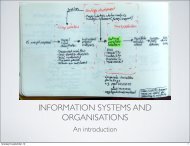Flensburg P: Personlig databehandling - Per Flensburgs hemsida
Flensburg P: Personlig databehandling - Per Flensburgs hemsida
Flensburg P: Personlig databehandling - Per Flensburgs hemsida
You also want an ePaper? Increase the reach of your titles
YUMPU automatically turns print PDFs into web optimized ePapers that Google loves.
<strong>Per</strong> <strong>Flensburg</strong>: <strong><strong>Per</strong>sonlig</strong> <strong>databehandling</strong><br />
Irrespective of the tools they are using, the people were satisfied with the choice and<br />
the way of working with them. On the other hand, they do not seem to perform any<br />
deep evaluation either of tools or of suitable applications. The choice seems to be<br />
more or less randomly. No company have any well planned strategy for introducing<br />
this new way of working. But the people using the support systems are all convinced<br />
about the profits, both in money terms and particularly in terms of quality of work<br />
performance. They all think they could do a much better job than before and also do<br />
things they had not previously conceived of doing.<br />
I have found it relatively easy to detect effects on job skills since the people, without<br />
exception so far, think the use of a user-developed support system has greatly improved<br />
their ability to do a good job. Concerning the other job satisfaction factors, no<br />
effects have been detected. Some people admit they have more influence due to their<br />
improved job performance, but that is all.<br />
I also distinguish two or maybe three levels of using the tools. The occasional user<br />
who uses a prewritten procedure in order to get a report from the data base or some<br />
computations in the spreadsheet program or a picture plotted with the graphical<br />
system can illustrate the first level of use. (S)he also might use the command mode of<br />
the query language or the spread-sheet program in order to answer some ad hoc<br />
questions. The local expert, who can write procedures, create new files and help other<br />
people with more complex questions, can illustrate the second level of use. People<br />
from the information centre who help the local expert with the more complex jobs or<br />
when the system has broken down might illustrate the third level.<br />
People use the support system to produce reports, which they are working with at<br />
their desks. The terminals are not necessarily located on the users desks, but can be<br />
found in another room, enabling more people to make use of it. However, people<br />
working with large calculations seem to require the terminal at the desk.<br />
Response times fluctuate widely. I have seen applications with surprisingly quick response<br />
times but also applications where response time could be up to 15 minutes. As<br />
a rule, people think they are rather slow, but it is not considered to be a serious<br />
problem.<br />
Knowledge of the data model (the system) is more important than knowledge of the<br />
tools. The data bases used by the companies are usually complex and require great<br />
skill from the users of the support systems to make effective use of them. Thus the<br />
local experts are experts both on the tool and on the data model. <strong>Per</strong>haps they can be<br />
considered as local data base administrators.<br />
7.3.2 Comments to the case studies<br />
The purpose of the research was to get a brief overview of empirical experiences and<br />
to describe what people thought about their job with user developed systems. Some<br />
192







